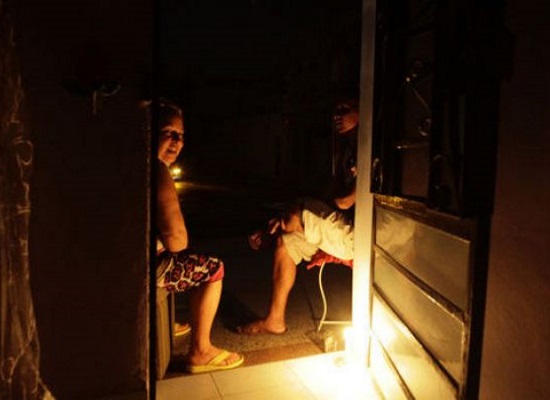Havana Cuba. — Since Thursday night, the interest of Cuban communist propaganda focused on the “special appearance” of the president and first secretary Miguel Diaz-Canel Bermudez. The “commander of the Revolution” Ramiro Valdés, the Minister of Energy and Mines and other high-ranking officials from the industry also participated. The theme of the event was the worrying national electricity situation.
This extraordinary intervention was made during the prime time of Cuban Television, just before the Brazilian soap opera. This circumstance, together with the fact of having eliminated the program of agitation and propaganda edgedclearly demonstrates the deep concern that this issue of blackouts causes in the upper echelons of the Castro regime.
The diaznelist peroration had several aspects. In a first phase, the boss reviewed the “states of opinion of the population”. It is about what, in a slightly more colloquial language, is known among the regime’s assholes as “the opinion of the people.” We are talking about a network of voluntary informants who communicate to the leadership of the single party the opinions they can hear on issues of public interest.
In this activity, these gentlemen do not reach the category of informer: it is not necessary for them to explain who expressed the dissenting opinion. Only the transcript of what was said and heard is required. In other words: the miracle is narrated, but without having to mention the saint. Through this tactic, the regime avoids the rejection that the denunciation arouses even among its own supporters.
It is in this primitive way that mayimbes Castroists find out more or less what the Cuban people really think. Here it is convenient to return to the same previous idea: that information is reserved for the top management. If on this occasion that senior staff saw fit to share that facet of reality with ordinary citizens, it was only because of a special favor that the supreme chief granted us, which is explained by the fear that the issue of blackouts provokes in the High spheres.
In a second stage, Díaz-Canel stood before a table that contained two almost parallel statistical curves, colored red and green, respectively. Without bothering to explain to the viewers what each of the two lines represented, the First Secretary of the only party gave them a general explanation of the problems of electricity generation.
In summary, the picture described by the supreme hierarch was not at all flattering. The foregoing includes a surprising acknowledgment: “We have had to stop important activities in our economy because we have used fuel fundamentally for electricity generation and above all to meet the needs of the population.”
In another part of his spiel, according to CubadebateDiaz-Canel cited a popular question: “Why haven’t new investments been made in thermoelectric plants? The population asks itself.” And he replied: “An investment in thermoelectric plants is extremely expensive for the country and takes years.” In short, he reported that now, in a negotiation with a mysterious “friendly country”, the installation of three or even four new generation blocks is being discussed.
And here it seems to me that it is convenient to make a general consideration about the prevailing leadership system. One of two things: either “socialist planning” is not even remotely close to the wonders that Castro’s propaganda says about it (in which case it would be convenient to dispense with that inoperative mechanism), or it really is excellent (but then those responsible for the new failure would be the planners, who should be removed en masse).
In short, the great affected will continue to be the same as always: the resigned Liborio Pérez, personification of the Cuban people. He will continue to suffer from annoying blackouts, which will become even more intolerable this summer, when tenants in tenement houses (often even without windows) cannot bear the heat of their rooms without a fan to at least give them a little fresh.
And patient Liborio was precisely one of those summoned by the President who was not voted on by the people: “In the country there are almost four million homes, if only three million would turn off a 20-watt light bulb that may be unnecessarily on, that would immediately represent a power of 60 megawatts.
That account, which reminded me of the Great Captain, takes us squarely to the role that the same victim of the blackouts must play in the solution to that evil. That claim, in turn, leads me to recall a real anecdote that I experienced in the eighties of the last century. I do not blame those who doubt its veracity: I admit that I myself would not have believed it if I had not lived and suffered that unlikely reality.
One night, I was visiting a friend’s house. At that time he lived in the little street Rodríguez Fuentes, in the Havana neighborhood of Lawton. Total darkness reigned in the building (and in the block as a whole), but the surroundings were illuminated. Surprised, I questioned my friend. This one, with a sulky air, revealed to me the amazing explanation: “It is that we are in a voluntary blackout…”.
It turned out that all the houses on the block were receiving electricity. However, apparently due to a decision made at the CDR level (Committees for the Defense of the Revolution), it had been decided to “voluntarily” dispense with its use. And, in fact, I could see two subjects who, in the middle of the darkness, wandered through the middle of the street, looking with a stern frown towards the interior of the houses, to see if a neighbor dared to turn on a light bulb or a television. “That is the President of the CDR”, explained my friend.
That amazing reality makes me formulate a suggestion —which is also a challenge— to Díaz-Canel, yes, but also to the spy Gerardo Hernández Nordelo, who, emulating an Egyptologist who wanted to revive the mummy of Ramses II, aspires —to these heights!—to reactivate the moribund (not to say already dead) CDR institution that has been entrusted to it.
The suggestion-challenge consists of the following: What do you think of the idea of taking advantage of the “elevated revolutionary consciousness of the people” to summon them to a “voluntary blackout”? But not at the level of a secondary street in a Havana suburb, but on a national scale! If the idea (which is not mine, but that of an unknown cederista president from the 1980s) succeeds, the blackouts would end once and for all! Or not!
OPINION ARTICLE
The opinions expressed in this article are the sole responsibility of the issuer and do not necessarily represent the opinion of CubaNet.
Receive information from CubaNet on your cell phone through WhatsApp. Send us a message with the word “CUBA” on the phone +1 (786) 316-2072, You can also subscribe to our electronic newsletter by giving click here.






